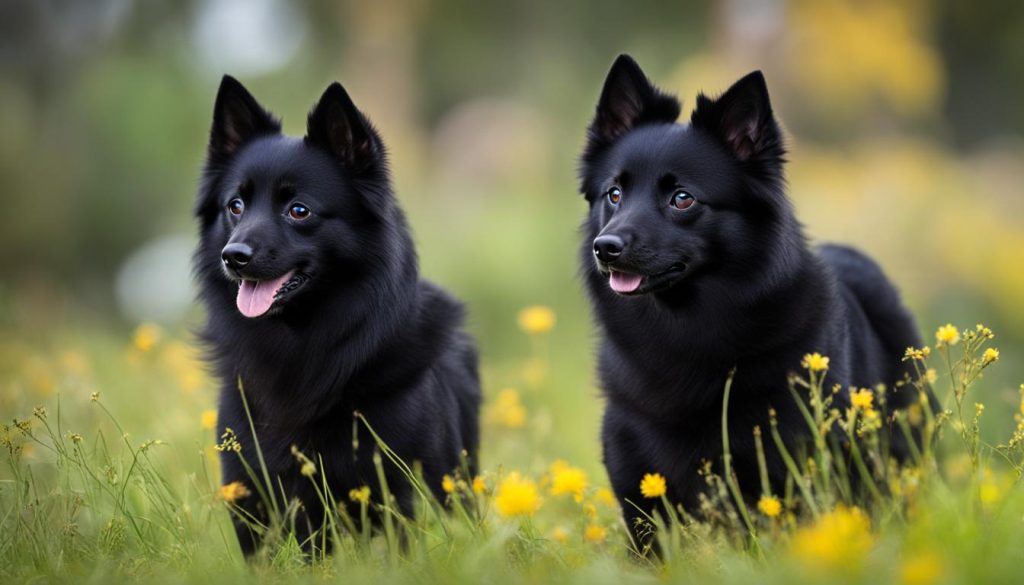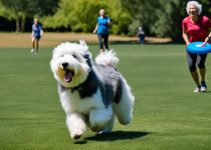Training a Schipperke is a vital part of ensuring the well-being and happiness of your furry companion. Whether you’re starting with a playful puppy or an adult dog, implementing effective training methods can help build a strong bond and foster positive behavior.
When it comes to Schipperke training, there are various techniques and tips to consider. From obedience training to behavior and command training, a comprehensive approach is key. It is advisable to use positive reinforcement methods, focusing on rewards and praise, as this encourages desired behavior and helps create a positive learning environment.
To achieve consistent results, establishing a Schipperke training schedule is crucial. Regular practice and repetition reinforce training commands and build a routine that your Schipperke will respond to. Utilizing a training guide can provide valuable insights into the breed’s specific needs and behavioral tendencies.
Attending Schipperke training classes can also be beneficial, as professional trainers can provide guidance and support tailored to your Schipperke’s individual requirements. Additionally, incorporating resources such as leash training, crate training, and clicker training can enhance the effectiveness of your Schipperke training sessions.
Schipperke Training
- Utilize positive reinforcement methods, focusing on rewards and praise.
- Establish a consistent training schedule for effective results.
- Consider using a training guide for insights into the Schipperke breed.
- Attend training classes for professional guidance.
- Incorporate resources such as leash, crate, and clicker training for enhanced effectiveness.
Understanding the Schipperke Personality
Schipperkes have a unique and fascinating personality that sets them apart. Their alertness, curiosity, and independence are some of the distinct traits that define their temperament and behavior. As excellent watchdogs, Schipperkes are naturally vigilant and always on the lookout, making them reliable protectors.
Intelligence is another prominent characteristic of the breed. Schipperkes are quick learners, often figuring out things on their own. However, their intelligence can sometimes lead to mischief if not properly channeled. Early training is essential to teach them how to use their energy in a positive way.
Socialization is crucial for Schipperkes. Introduce them to various people, animals, and environments from a young age to ensure they feel comfortable and confident in different situations. Proper socialization also helps prevent the development of any undesirable behaviors, such as fear or aggression towards strangers.
Understanding the Schipperke personality is fundamental to a successful Schipperke training and building a healthy relationship with this breed. Embrace their uniqueness, provide them with appropriate mental and physical stimulation, and watch as their charming personality shines through.

Key Characteristics of Schipperkes:
- Alertness
- Curiosity
- Independence
- Vigilance
- Intelligence
- Mischievousness
- Socialization requirements
Nutritional Considerations for a Healthy Schipperke
Aside from Schipperke training, providing proper nutrition is crucial for maintaining the overall health and well-being of a Schipperke. As a proud Schipperke parent, I prioritize my furry friend’s dietary needs to ensure they live a happy and energetic life.
To support their active lifestyle, I make sure their diet consists of high-quality proteins, healthy fats, and carbohydrates. These essential nutrients not only promote muscle strength but also contribute to a glossy coat that adds to their adorable appearance.
One of the valuable additions to their diet is bone broth. Including bone broth provides additional benefits such as joint health and immune system support, keeping my Schipperke in optimal condition.
When it comes to meal preparation, I prefer the sous-vide cooking method as it helps preserve the nutrients and flavors of the ingredients. This technique ensures that my Schipperke enjoys a delicious and nutritious meal every time.
As pet parents, we must offer a balanced diet that includes all the essential vitamins and minerals. These nutrients play a crucial role in maintaining their overall health and vitality.
Hydration is another important aspect of Schipperke nutrition. Adequate access to fresh water ensures that my furry friend stays hydrated throughout the day.
Overall, by paying attention to their nutritional needs, following a balanced diet, and providing sufficient hydration, I can confidently say that I am giving my Schipperke the best care possible.

Key Points:
- Include high-quality proteins, healthy fats, and carbohydrates in their diet.
- Consider adding bone broth to support joint health and boost their immune system.
- Utilize the sous-vide cooking method to preserve nutrients and enhance flavors.
- Ensure balanced meals with essential vitamins and minerals.
- Provide access to fresh water for adequate hydration.
Training and Socialization Tips
Training a Schipperke requires patience, consistency, and love. As a responsible owner, it’s important to understand effective Schipperke training techniques that can help your furry friend become well-behaved and obedient.
Schipperke Training Tips
- Utilize positive reinforcement: Reward your Schipperke with treats, praise, and affection when they exhibit desired behavior. This encourages them to repeat those actions.
- Be consistent: Establish a routine and stick to it. Consistency helps your Schipperke understand what is expected of them and facilitates faster learning.
- Keep training sessions short and fun: Schipperkes have a naturally playful nature, so incorporating toys and enjoyable activities during training can make it more engaging for both of you.
- Break tasks into smaller steps: Complex commands may be challenging for a Schipperke to grasp initially. Break them into smaller tasks and gradually progress as they become more comfortable.
Schipperke Obedience Training
- Teach basic commands: Start with fundamental commands like sit, stay, come, and lie down. These commands form the foundation of obedience training and help keep your Schipperke safe in different situations.
- Stay positive: Use a cheerful and positive tone while giving commands. This helps create a pleasant training environment for your Schipperke and strengthens your bond.
- Practice leash training: A properly leash-trained Schipperke is easier to manage during walks and outings. Start by introducing them to the leash in a calm and controlled environment.
- Seek professional guidance: If you encounter difficulties in training your Schipperke, consider enrolling them in obedience classes or hiring a professional trainer for personalized guidance.
Schipperke Socialization
Socializing your Schipperke from a young age is crucial to help them become comfortable and well-behaved around different environments, people, and animals.
- Expose them to various experiences: Introduce your Schipperke to different sounds, sights, and environments. Take them on walks, introduce them to other pets, and invite visitors to your home.
- Positive interactions: Encourage positive interactions with other dogs and people. Reward your Schipperke for calm and friendly behavior during these encounters.
- Manage fear and anxiety: If your Schipperke exhibits fear or anxiety in specific situations, gradually expose them to those situations and provide reassurance. Consult with a professional if severe anxiety persists.
- Monitor playtime with other dogs: While it’s important for your Schipperke to socialize, always observe their interactions with other dogs to ensure they are safe and respectful.
Remember, training and socialization go hand in hand to raise a well-rounded and obedient Schipperke. By implementing these tips with love and patience, you’ll be nurturing a happy and well-behaved furry companion.
Health and Wellness: Ensuring a Long, Happy Life
Taking care of a Schipperke’s health and wellness is essential for their overall well-being. As a devoted owner, I prioritize my Schipperke’s wellbeing by regularly attending veterinary check-ups and addressing any specific health concerns that may arise. These check-ups are crucial for early detection and effective management of potential health issues that are commonly associated with the breed.
I understand the importance of providing my Schipperke with a balanced diet, ensuring they receive the necessary nutrients for optimal health. Regular exercise and mental stimulation are also key components of their well-being. Whether it’s going for daily walks or engaging in interactive playtime, these activities keep my Schipperke physically and mentally stimulated, contributing to their longevity and happiness.
Grooming plays a significant role in maintaining my Schipperke’s beautiful coat and overall hygiene. Regular brushing helps minimize shedding while keeping their fur soft and free of tangles. I also make sure to check their ears regularly for any signs of infection and trim their nails to prevent discomfort and injury.
For my Schipperke, achieving a balanced life means striking a harmony between playtime and relaxation. I prioritize their mental health by providing them with opportunities to unwind and relax alongside their daily activities. This balance ensures that my Schipperke maintains a happy and healthy lifestyle.
Conclusion
Training and caring for a Schipperke can be a rewarding and fulfilling experience. By following effective training tips and techniques, understanding their unique personality, providing proper nutrition, and prioritizing their health and wellness, you can have a well-behaved and happy Schipperke companion.
Remember to enjoy the journey and build a strong bond with your furry friend through positive Schipperke training methods and love. Training a Schipperke requires patience, consistency, and positive reinforcement. Socialization from a young age is vital to help them become comfortable with different environments and social interactions.
Additionally, prioritizing their health and wellness is crucial. Regular vet check-ups, a balanced diet, regular exercise, and grooming ensure their overall well-being. Balancing playtime with relaxation is important for their mental health and ensuring a happy and healthy life.
FAQ
What are some effective training tips for Schipperkes?
Some effective training tips for Schipperkes include using positive reinforcement techniques, developing a training schedule, utilizing a training guide, attending training classes, and using resources like leash training, crate training, and clicker training.
What is the personality of a Schipperke like?
Schipperkes have a unique personality characterized by their alertness, curiosity, and independence. They are excellent watchdogs due to their vigilant nature. They are intelligent and sometimes mischievous, requiring early training to channel their energy in a positive way. Socialization from a young age is also important for them to be comfortable with strangers and other pets.
What should I consider in terms of nutrition for my Schipperke?
Proper nutrition is crucial for maintaining the overall health and well-being of a Schipperke. Their diet should consist of high-quality proteins, healthy fats, and carbohydrates to support muscle strength, a glossy coat, and energy for their active lifestyle. Including bone broth in their diet can provide additional benefits for joint health and immune system support. Sous-vide cooking method and balanced meals with essential vitamins and minerals are also important for their nutrition. Adequate hydration should not be overlooked, and access to fresh water should always be available.
What training and socialization tips are important for Schipperkes?
Training a Schipperke requires patience, consistency, and love. Positive reinforcement techniques, such as using treats and praise, should be employed to encourage desired behavior. Incorporating toys and fun activities into training sessions can make them enjoyable for both the dog and the owner. Socialization from a young age is vital to help the Schipperke become comfortable with different environments, people, and animals.
How can I ensure the health and wellness of my Schipperke?
Taking care of a Schipperke’s health and wellness is essential for their overall well-being. Regular vet check-ups are important for early detection and management of any health concerns that may be specific to the breed. Providing a balanced diet, regular exercise, and mental stimulation contribute to their long and happy life. Grooming, including regular brushing, ear checks, and nail trims, helps maintain their beautiful coat and overall hygiene. Balancing playtime with relaxation is crucial for their mental health and ensuring a happy and healthy life.






